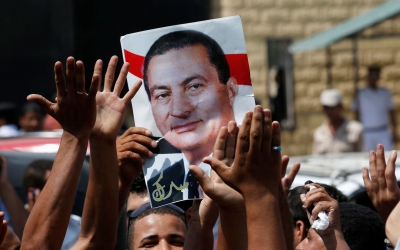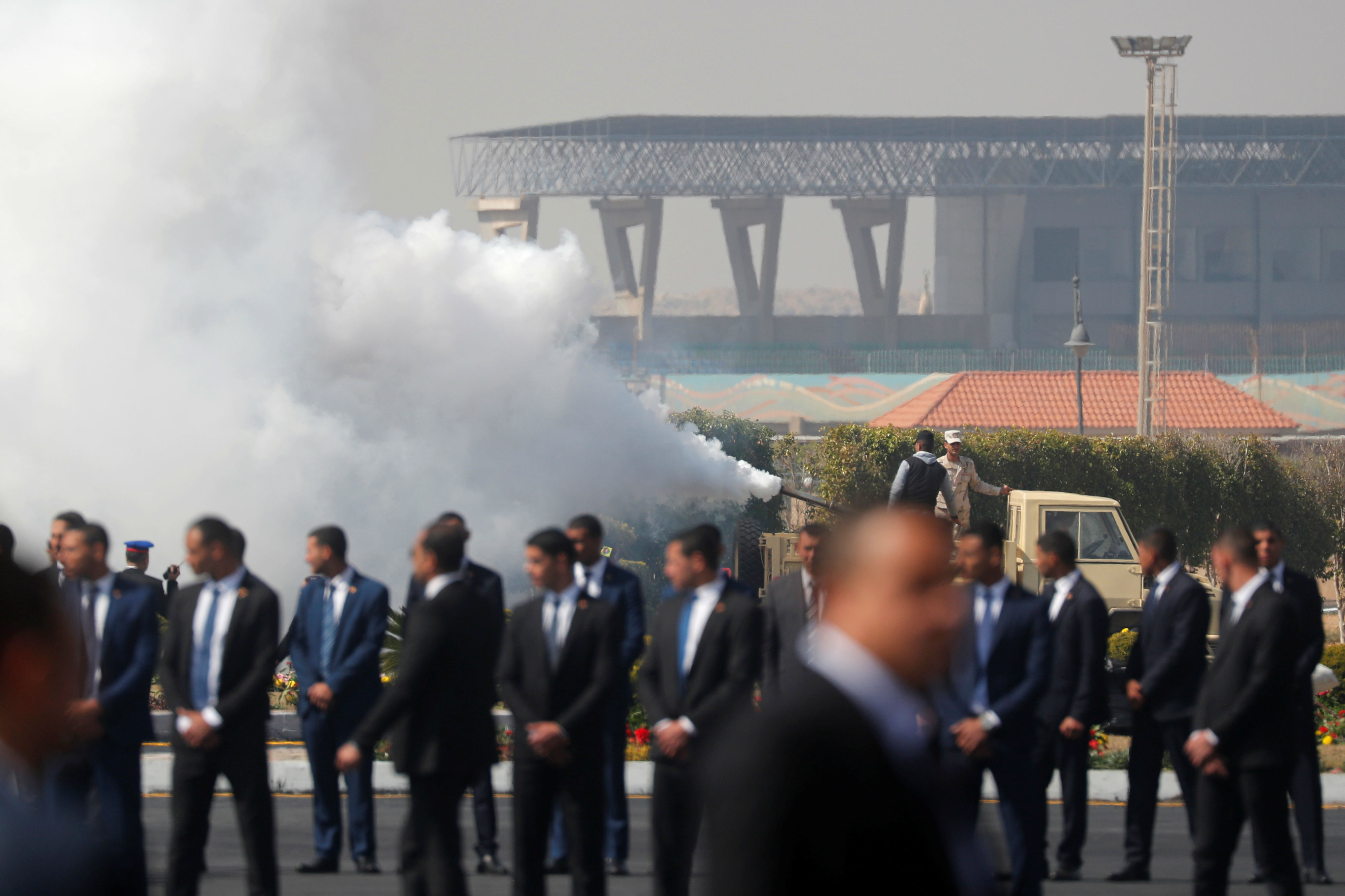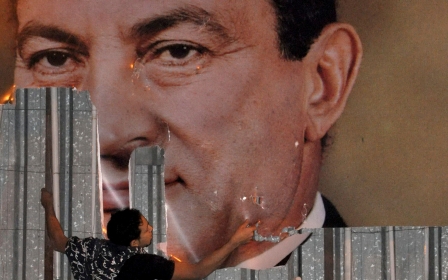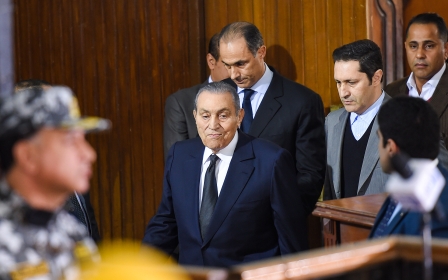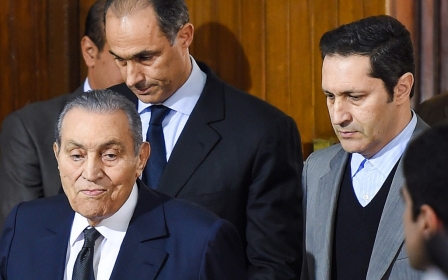Egyptians gather to see Sisi stand with Mubarak's sons at autocrat's funeral
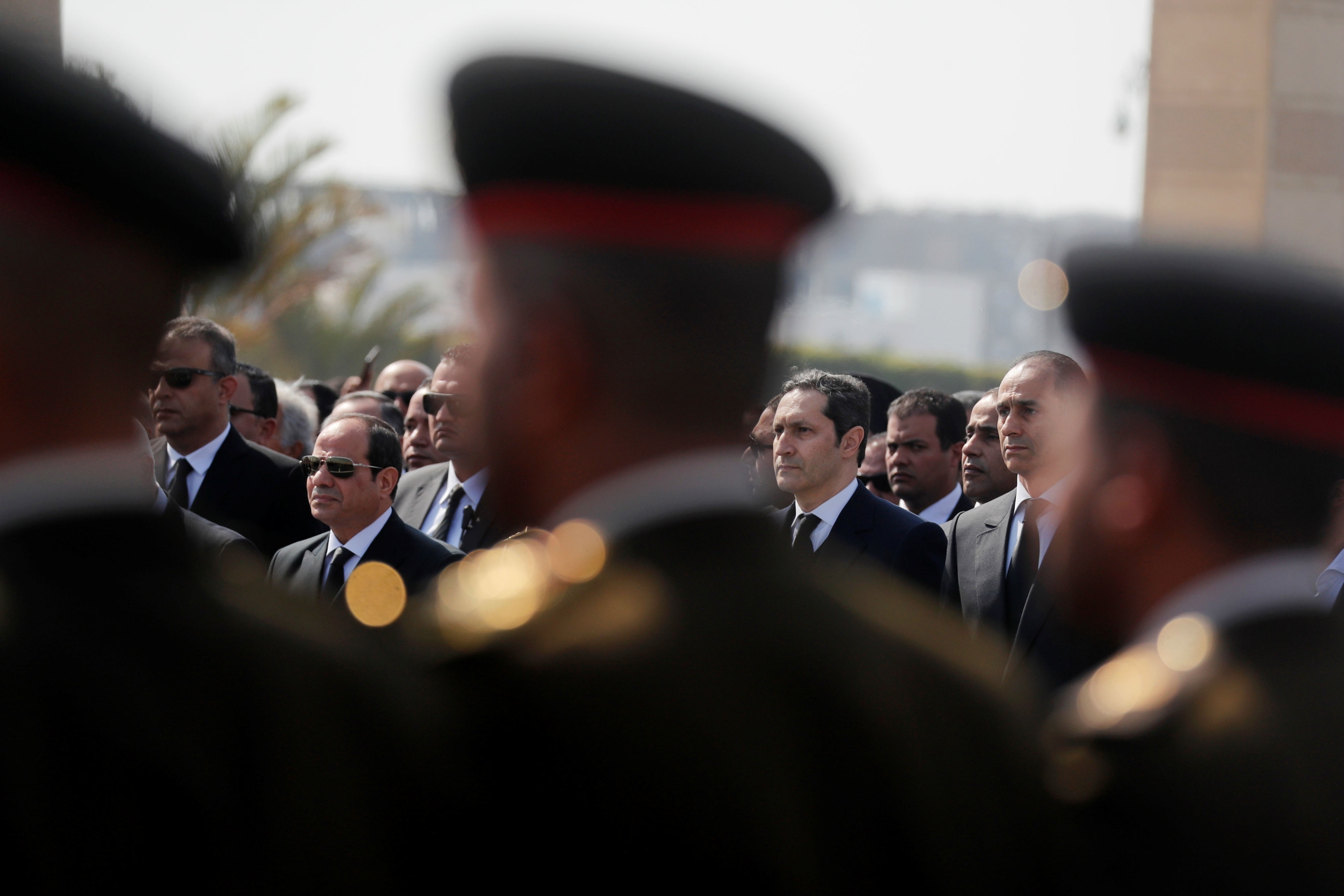
Supporters of Hosni Mubarak gathered outside the Mushir Tantawi Mosque in the upmarket New Cairo district on Wednesday, to mourn the deceased former president far away from the Egyptian capital's crowded old town.
Among them was Ahmed, a worker at a ceramics factory owned by Mubarak-era businessman Mohamed Abou el-Enein, the founder and chairman of Cleopatra Group.
Along with dozens of his colleagues, Ahmed was bussed to the funeral of toppled autocrat Mubarak, who died at 91 on Tuesday.
It’s not the first time Ahmed was forced by his employers to cheer for Mubarak. In 2003, he was also taken with his colleagues to stage a pro-government demonstration, in response to anger stoked by the war in Iraq.
The workers were promised a day's pay and a meal, as well as a ride to the nearest point home, in return for gathering and mourning Mubarak.
"Abou el-Enein's wealth was built during the Mubarak era. He and the Mubaraks were tight," Ahmed told Middle East Eye.
The businessman was one of the dozens of Mubarak-era figures who attended the military funeral. Former military intelligence chief and current Egyptian President Abdel Fattah el-Sisi spearheaded the march right next to Mubarak's sons Gamal and Alaa and the state's top judicial, legislative, religious, and military officials, in addition to hundreds of army and police personnel.
In attendance were also top businessmen and officials who were accused of corruption after the 2011 revolution that toppled Mubarak, but were later released by the Egyptian judiciary.
The vicinity of the Mushir Tantawi Mosque (named after the former Mubarak-era field marshal Mohamed Hussien Tantawi), was occupied by masked presidential guard special forces with armoured cars and shock troops in jeeps patrolling the surrounding streets.
In addition to the military funeral, media outlets reported that the family will host a reception at the same mosque.
Old guard
Among the civilians who waited for the funeral to start was Mohamed Mostafa, a law student in his final year at Menoufia University and a member of the Nation’s Future Party. Mostafa said that he and his friends came for personal reasons, not as members of their party, which is linked to the ruling military.
"We came to attend the funeral of the man whose picture was hung in our classrooms when we were children, and a fighter who defended our honour," he explained.
When asked about those criticising the military funeral awarded to such a controversial figure, the excited young man said: "Whoever said this is a traitor to the nation. They are the [members of Muslim] Brotherhood who want to defame the history of the country."
Close by was an elderly woman carrying a picture of Mubarak in his military uniform. "In his time, people were safe and we lived a decent life, and all Egyptians were united in one front. He deserves our respect and love," she said.
Representatives of the Gulf states were some of the earliest arrivals, who publicly mourned Mubarak in official statements. Dozens of military and police cadets were deployed to march in front of the coffin, which arrived around midday by a military helicopter.
Awaiting the presidential convoy, some of the mourners started to take selfies with figures of the former regime, such as ex-pilot and commander of the Egyptian air force Ahmed Shafik, former prime minister Ahmed Nazif, and Ahmed Ezz, steel tycoon and head of Mubarak’s now-dissolved ruling National Democratic Party.
On his arrival, Sisi shook hands with Mubarak’s family, including his grandson, two sons and wife.
As the mourners started to march with the presidential guard securing the coffin, the sound of a neat 21-gun salute mixed with the chants of civilians, who were surrounded by plain-clothed police agents keeping them away from the official convoy.
Outside the Mubarak's graveyard, which is owned by the family and is located in the wealthy Heliopolis neighbourhood where they resided, dozens of mourners also gathered outside the security cordon that the police staged.
One of them, Ismail Mohamed, described the funeral as "an act that returned the honour of the Mubaraks after 2011", calling the revolution "25 Khasair" (25 losses) instead of "25 Yanayir" (25 January).
As the crowd chanted "Gamal tell your father, the 100 million love you," Fathia, a fruit street vendor who joined the gathering, described him as "a father to all Egyptians who was kind to the poor and didn’t raise the prices".
Orders are orders
Hours after announcing Mubarak's death, the Egyptian state and military publically mourned him, describing him as a "war hero".
Orders were given to all media channels and newspapers to highlight the man's achievements, a general intelligence source told Middle East Eye through the phone.
The source, who requested anonymity, said that media were requested to ignore the 2011 revolution and any criminal cases Mubarak was involved in, and only focus on "the political stability during his time, his military profile, returning the last piece of Sinai, his fight against political Islam, the peace with Israel, and his ability to defy the America and the West".
'The state has made it clear that 25 January was a conspiracy that used young people to agitate the masses'
- Intelligence source
Two journalists working at state-owned outlets confirmed they had been given editorial instructions to praise the former military leader and play up his image of a fatherly figure, "which works well with sensationalistic Egyptians".
Several privately owned and public media channels placed an image of a black ribbon on the left side of their screen as a sign of mourning, while items praising the former president were repeated again and again.
The official outpourings of grief were a far cry from the state's supposed respect for the 2011 revolution that ousted Mubarak.
"The state has made it clear that 25 January was a conspiracy that used young people to agitate the masses and then it was 'kidnapped' by the US and the Muslim Brotherhood to achieve their interests," the intelligence source said.
Middle East Eye delivers independent and unrivalled coverage and analysis of the Middle East, North Africa and beyond. To learn more about republishing this content and the associated fees, please fill out this form. More about MEE can be found here.


